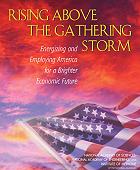|
|
|
|
|
|
|
News & Views item - January 2009 |
![]() Rising Above the Gathering Storm. (January 12, 2009)
Rising Above the Gathering Storm. (January 12, 2009)
The New York Times columnist Thomas Friedman is his January 10 column
writes:
[H]ere’s hoping that our new administration and Congress will be guided in shaping the [financial] stimulus by reading John Maynard Keynes in one hand — to get as much money injected as quickly as possible — and by reading “Rising Above the Gathering Storm: Energizing and Employing America for a Brighter Economic Future” with the other.
The Gathering Storm was the assessment by the US National Academies of the crying necessity to improve mathematics and science education, upping investment in long-term research and seducing the best foreign students, thereby forwarding innovation supported by a sound infrastructure.
Concurrently, Robert Koenig writing for Science Insider makes the point: "While some fear that the scientific and technical assistance programs to Africa and other developing regions may suffer as a result of the economic downturn, Harvard University's Calestous Juma, an expert on the topic, believes it may have the opposite impact."
Professor Juma notes that Mr Obama's Presidential Science Advisor will be John Holdren, Juma's colleague at the Belfer Center for Science and International Affairs at Harvard's John F. Kennedy School of Government, while Harold Varmus of the Memorial Sloan-Kettering Cancer Center in New York City and Eric Lander of the Broad Institute in Cambridge, Massachusetts, will co-chair the President's Council of Advisors on Science and Technology. Both are all internationally minded and will "think globally."
However, what's worrying Mr Friedman is not Barack Obama's resolve regarding support for the Gathering Storm "roadmap" but support by the 111th Congress.
Barack Obama gets it, but I’m not sure Congress does. “Yes,” Mr. Obama said on Thursday, “we’ll put people to work repairing crumbling roads, bridges and schools by eliminating the backlog of well-planned, worthy and needed infrastructure projects. But we’ll also do more to retrofit America for a global economy.” Sure that means more smart grids and broadband highways, he added, but it also “means investing in the science, research and technology that will lead to new medical breakthroughs, new discoveries and entire new industries.”
Mr Friedman then suggests: "we should also give everyone who is academically eligible and willing a quick $5,000 to go back to school. Universities today are the biggest employers in many Congressional districts, and they’re all having to downsize", and adds: There’s simply no shortcut for a stimulus that stimulates minds not just salaries. “You can bail out a bank; you can’t bail out a generation,” says the great American inventor, Dean Kamen, who has designed everything from the Segway to artificial limbs. “You can print money, but you can’t print knowledge. It takes 12 years.”
There's quite a bit in this for Australia's Prime Minister, Kevin Rudd, to ponder as his cabinet debates what to do with/about the innovation and higher education reviews in relation to Australia remaining/becoming relevant within its OECD cohort.